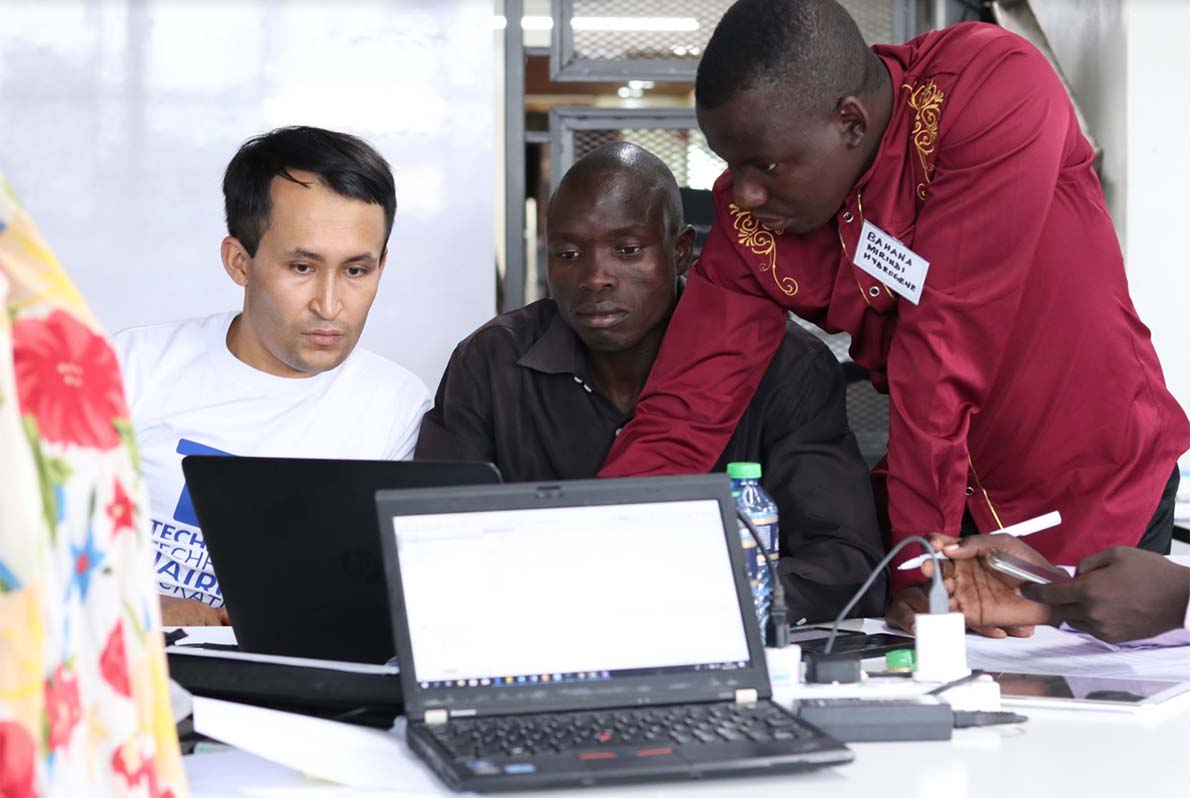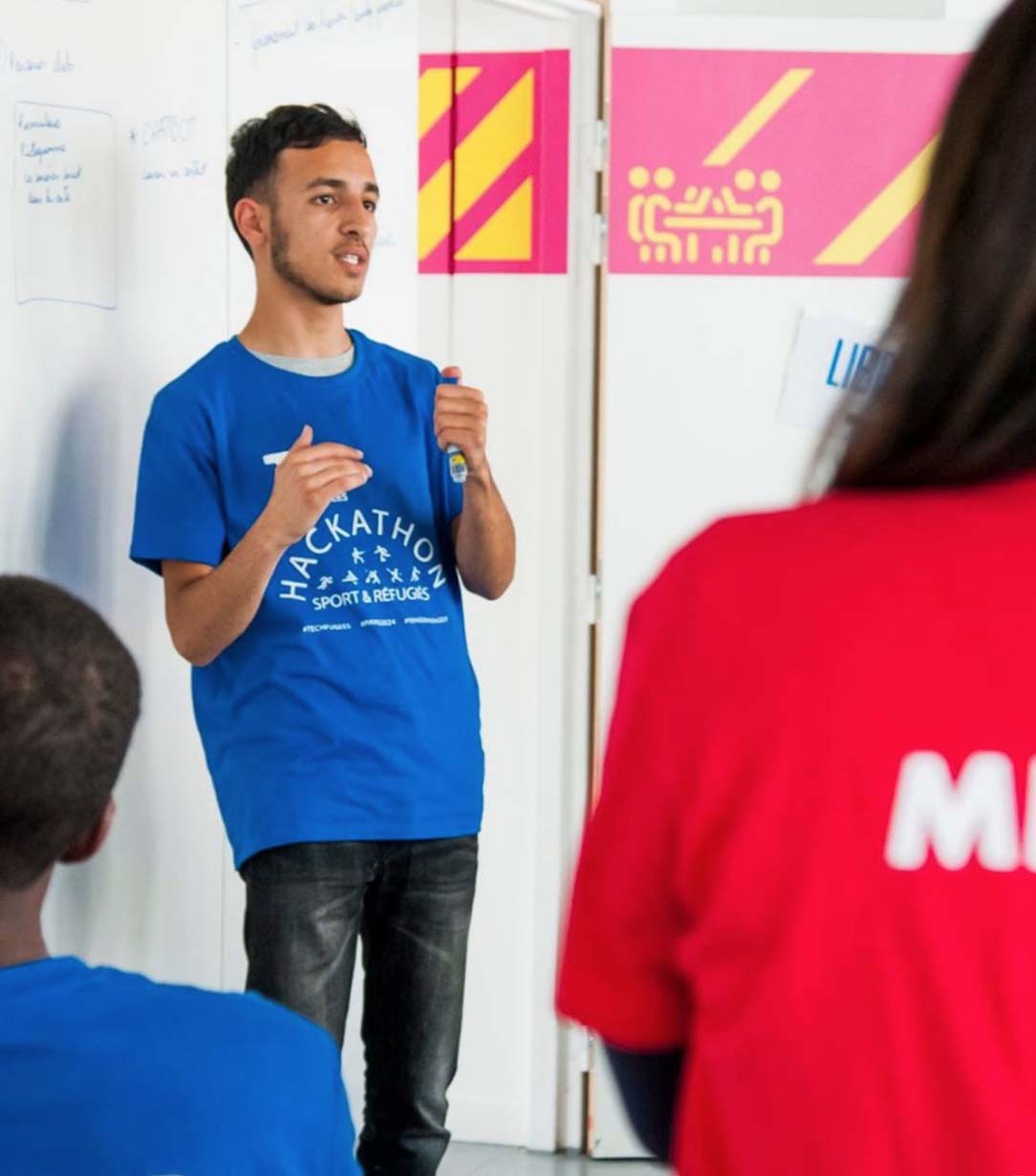Techfugees is an international non-profit organization which coordinates the commitment of the technology community to building solutions with displaced people and contributing to meet their needs in terms of access to rights, education, health, employment and social inclusion.
Techfugees manages and supports long-term projects for displaced people within the framework of the 17 Sustainable Development Goals of the United Nations.
Techfugees has developed these Guiding Principles based on nearly 4 years of experience running hackathons and events in 25 countries. This experience is the basis, on which we have developed the strong belief that tech projects can have a long-term impact on refugees and displaced people if they are guided by a set of ethical principles and values.
These Guiding Principles are not imposed on the community as a prescription but are here to guide our collective action towards a shared goal: to create technology that empowers displaced people around the world.
These Guiding Principles are aimed at providing you with useful guidance to start a #tech4refugees’ project and it is important to both recognize that there is always a huge amount of extra resources and partners needed for a successful implementation.
We, at Techfugees, strive to facilitate access to these resources & partners/

يبني مجتمع Techfugees تكنولوجيا تساعد في تلبيّة احتياجات اللاجئين والمُهجَّرين.
يجب أن يستخدم أيّ تصميم ونشر لتقنيّة منهج تصميم متمركز حول الإنسان، وهو عمليّة تبدأ مع اللاجئين وتنتهي بحلول مُصمَّمة خصيصًا لتناسب احتياجاتهم.
إن التصميم المتمحوِّر حول الإنسان يدور حول بناء تعاطف عميق مع المستخدِمين وتشارُك الابتكار معهم.
في عمليّة بناء تكنولوجيا مع ومن أجل الأشخاص المُهجَّرين، لا تسعَ لجعلْ المستخدِمين المُستهدَفين مستفيدين من تقنيّتك فقط، بل اسع لتصميمها معهم وجعلهم مشاركين في ابتكارها.
من خلال منحِهم الفرصة لتحقيق إيرادات أو تعلُّم شيء جديد من خلال استخدام تقنيّتك، وهكذا لن يقتصر الأمر بأن يكون الأشخاص اللاجئون والمهجَّرون مستفيدين من الخدمات التي يقدُّمها منتجك فحسب بل سيكونون مناصرين مُمكَّنين لدعم تقنيّتك.

إنَّ استخدام البيانات يمكنه أن يساعد الأشخاص المهجَّرين كما يمكنه أن يَضرَّهُم. وعليه فإن حماية الفئات المستضعَفة من الأضرار التي يسببها استعمال البيانات هو مسؤولية تشاركية.
إليكم بعض التوصيّات التي يجب أخذها بعين الاعتبار:
– لا يجب أن نقوم بتجميع وإنشاء واستخدام البيانات فقط لأننا نستطيع أن نقوم بذلك؛ مدى الاحتياج والمنافع المُحتمَلة يجب أن تكون معرَّفة ومبرَّرة كوسيلة للاستجابة لحاجة أو لتطوير خدمة مقدَّمة للاجئين.
– افترضْ أنَّ جميع المستخدمين لن يقرأوا الأحكام والشروط الخاصة بمنتجك التكنولوجي. لذا فكِّر بالعواقب الأخلاقيّة من تجميع البيانات وأنت تصَمِّمْ منتجَك.
– إذا اخترتَ الكشف عن البيانات، فإنَّ هذه الفعلْ يجب ألّا يؤدي إلى مزيد من الضرر والاستغلال للمجتمعات والأفراد المستضعَفين أصلًا. حدِّد مسبقًا المخاطر ذات الصلة جرّاء الاستخدام المقتَرح للبيانات، في حال كان ذلك ممكنًا.
– افترض أن الأنظمة السياسيّة المعاديّة قد تحاول الحصول على البيانات لغايات مؤذية. معظم قراصنة الكمبيوتر الذين تدعمهم الدولة وبعض خدمات المراقبة الحكومية قادرون على اختراق أيّة بيانات.
– نظرًا لأن معظم انتهاكات وتسريبات البيانات تأتي نتيجة خطأ بشريّ، فمن المهم أنْ تُوليْ عناية أكثر لطريقة تخزينها، ولمَنْ يمكنه الوصول وكيف يمكن لأيّ أحد الوصول لهذه البيانات. احرص دائمًا على الالتزام بالمعايير القانونية والأخلاقية المعمول بها.
–يجب تشارك أيّة بيانات أو نتائج مع المجتمع التي استُمِدّت منه. في المشاريع التقنيّة هناك عدد كبير من المجتمعات التي يتم الحصول على بيانات منها من دون أن ترى نتائج هذه البيانات.
– عمومًا، إن قاعدة مسؤولية البيانات هذه تتجاوز مفهوميّ “خصوصيّة البيانات و”حماية البيانات”. إذ أنها تنطوي على مجموعة من المبادئ، الإجراءات والأدوات التي تسعى للاستفادة من البيانات بهدف تحسين حياة الناس على نحوٍ مسؤول.
نحن في Techfugees نؤمن بالإبداع وتَشارُكْ الأفكار. وبالتالي، فإنّ نموذج المصدر المفتوح هو نموذجنا المفضَّل في تطوير البرمجيات عند بناء تقنيات للاجئين. إنّ مشاريع المصدر المفتوح تتلاءم مع فلسفتنا في تمكين المستضعَفين، والمهجّرين: إذ أنّ التعليمات البرمجية المفتوحة المصدر وبحكم طبيعتها ترسخ ضمان الوصول الشامل للجميع، اللامركزية وتشاركية الابتكار.


ما يمكنه أن يكون ناجعًا في تمكين الأشخاص المهجَّرين يمكن استخدامه لمساعدة فئات أخرى مستضعَفة كالمشرَّدين والعاطلين عن العمل.
إن بناء تكنولوجيا للاجئين يجب أن يساهم في تطوير كامل المجتمع المَحلّيّ: فلا يفاقِم من حالة عدم المساواة أو يُلحِق الضرر بأيّ فرد من أفراد المجتمع، مع السعي لمساعدة أكبر عدد ممكن.
خُذْ بالحسبان أنك تتعامل مع مستخدمين نادرًا ما يكون لديهم رفاهية الحصول على خيارات أخرى، وبالتالي يجب عليك ضمان تأمين خدمة متَّسِقة وأن تكون متجهِّزًا لاتخاذ تدابير مناسبة إذا ثبتَ أن التقنيّة مُختلَّة أو عفا عليها الزمن.
– نحن نشدِّد على ضرورة التفكير حول كيفية ملائمة منتَجِك لكامل النظام البيئي: أليسَ هناك حل موجود بالفعل؟ أنشِئْ قائمة واضحة بنماذج الأعمال، ولا تؤجلهم لوقت لاحق.
– إن وجود تطبيق لم يعدْ يعمل أو غير مُحدَّث يمكن أن يُضِرّ بحياة اللاجئين والمهجَّرين، ويقود لانعدام الثقة تجاه التقنيّات والنظام البيئي لتكنولوجيا اللاجئين. قُمْ ببناء أدوات يمكن للمجتمع أن يتملَّكها ويحافظ عليها حتى لو اختفيتْ.
– تحذير سريع بما يتعلق بالمنتجات المعتمِدة على الكثير من المحتوى الجديد: المحتوى يصبح قديمًا بسرعة. فكِّرْ مليًّا بمسؤوليتك عن إبقاءه مُحدَّثًا وعن اطلاع المستخدمين عن آخر تعديل له.
سوف تجدْ أنَّ الابتكار بهدف الاندماج صعبٌ: إذ يصبح الموضوع سياسيًّا جدًّا بسرعة كبيرة، والمشكلة أن القوانين ستقيِّد أو تمنع تمكين نفس الأشخاص الذين تحاول مساعدتهم.
بالتالي، فإنّ Techfugees توصي بأنْ تكون على دراية بالنهج المُستنِد على حقوق الإنسان.
فهو ” إطار مفاهيميّ لعمليّة التنميّة البشريّة مستنِد من الناحيّة التنظيميّة على المعايير الدولية لحقوق الإنسان وموجَّه من الناحيّة التشغيليّة لتعزيز وحماية حقوق الإنسان”.
لن يقتصر الأمر على تثقيفك في جوهر المشاكل الانمائيّة وكشف النقاب عن الممارسات التمييزيّة ومظاهر الإجحاف في توزيع السُلْطة، بل سيساعدك على إرساء نهجك وحلولك التقنيّة نحو نظام الحقوق والواجبات المقابلة التي ينصّ عليها القانون الدوليّ، بما يساعدْ في استدامة عملِك وتمكين الفئات المستضعَفَة التي تساعدها على المشاركة في صياغة السياسات.

لا يمكن للتكنولوجيا وحدها أن تعوّض غياب الإرادة السياسيّة أو افتقار الالتزام المشترك للتغلّب على هذا التحدي كمجتمع دوليّ.
نتفهم أنّ هناك تقييدات واضحة
على منتجات التكنولوجيا التي تدفعْ عملية التغيير، خصوصًا عندما يتعلق الأمر بتوسع نطاق استخدامِها.
نحن نحبّ المشاريع المُدرِكة للقيود المفروضة والتي تركِّز على حلّ أجزاء من المشكلة وفقَ سيّاقات محدَّدة، وتسعى في نفس الوقت لإعادة التصميم بهدف تموضعها من جديد في مجتمعات أخرى.
The Techfugees community builds technology that contributes to the response of the needs of refugees and displaced people.
Any design and deployment of technology shall use a human-centered design approach, which is a process that starts with refugees and ends with tailored made solutions that suit their needs.
Human-centered design is about building deep empathy with users and co-creating with your users.
In the process of building technology with and for refugees and displaced people, aim to make your targeted users not only beneficiaries of your technology, but aim to build it with them and make them co-creators.
By offering them the opportunity to make revenue or learn something new through the use of your tech, they not only benefit from the services your product offers, the refugees and displaced people become empowered advocates of your technology.
Displaced people can be helped as well as harmed by the use of data. Protecting these vulnerable people from the harms posed by data use is a shared responsibility.
Here a few recommendations to bear in mind:
– The collection, generation and use of data should never be done simply because they can be; the need and potential benefits should be clear, defined and justified as a way to respond to a need or improve the service towards refugees.
– Presume that all your users will not read the terms and conditions of your technology product. Consider the ethical implications of collecting data when building your product.
– If you choose to disclose data, it must not lead to already vulnerable individuals and communities being further harmed or exploited. In case where it is possible, pre-identify risks associated with a proposed used of data.
– Assume that hostile regimes may attempt to access data for the wrong reasons. Most State supported hackers and some Government surveillance services are capable of hacking any data.
– As most data breaches and leaking come from human failure, it matters that you take extra care in the way you store, who has access and how one can get access to the data. Make sure to always adhere to legal and ethical standards in place.
– Any data or results deriving from a population should be shared with that population. Too many communities in tech projects get asked for their data without seeing the results!
– Overall, this data responsibility rule goes beyond the concepts of “data privacy” and “data protection”. It entails a set of principles, processes and tools that seek to leverage data to improve people’s lives in a responsible manner.
At Techfugees, we believe in creativity and sharing ideas.
As such, the open-source model is our favored model for software development when building tech for refugees.
Open source projects are adequate with our philosophy of empowering vulnerable, displaced populations: open source code is of universal access, decentralized and co-created by nature.
It encourages collaboration and so peer-to-peer learning within the community.
What works at empowering displaced populations could be used to help other vulnerable populations, like homeless people or unemployed youth.
Building tech for refugees should aim to contribute to the improvement of the whole local community: not increasing inequality or harming any members of the community, while aiming to help as many as is feasible.
Keep in mind that you are dealing with users that rarely have the luxury to have other options; as such you should ensure consistent service and be ready to take appropriate measure if the technology proves to be dysfunctional or outdated.
– We stress the need to think about how your product fits into the whole ecosystem: isn’t there a solution that already exists? Line up clear ideas of business models, don’t postpone them for later.
– An app that does not work anymore or is left not up to date can harm the life of refugees and displaced people, creating distrust towards technology and the ecosystem of refugee tech. Build tools that the community can take ownership of and maintain even if you disappear.
– A quick warning for products relying on a lot of fresh content: content goes outdated fast. Think twice about your responsibility to keep it updated and your users informed about when it was last edited.
You will find that innovating for integration is tough: it becomes very political very fast and the issue tends to be that laws are constraining or preventing empowerment of the very people you are trying to help.
As such, Techfugees recommends that you become knowledgeable in a human rights-based approach. This is “a conceptual framework for the process of human development that is normatively based on international human rights standards and operationally directed to promoting and protecting human rights”.
Not only will it educate you to the heart of development problems and unveil the discriminatory practices and unjust distributions of power, it will help anchor your approach and tech solution to a system of rights and corresponding obligations established by international law, helping the sustainability of your work and empowering the vulnerable populations you help to participate in policy formulation.
Technology alone cannot make up for the absence of political will or the lack of a shared commitment to solving the challenge as a global community.
We understand that there are clear limitations with technological products that do drive change, especially when it comes to scaling.
We love projects that are aware of their limitations and focus on solving parts of the problem in specific contexts while seeking to redesign for re-localisation to other communities.